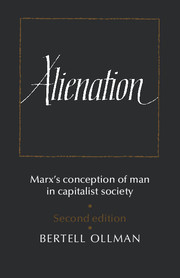Book contents
- Frontmatter
- Contents
- Preface to the second edition
- Note on translations
- Acknowledgements
- General introduction
- PART I PHILOSOPHICAL INTRODUCTION
- PART II MARX'S CONCEPTION OF HUMAN NATURE
- 7 Powers and needs
- 8 Natural man
- 9 Species man
- 10 Relating man to objects: orientation, perception
- 11 Appropriation
- 12 Nature as evidence
- 13 Activity, work, creativity
- 14 Man's social nature
- 15 The character of the species
- 16 Freedom as essence
- 17 Man, classes, people
- PART III THE THEORY OF ALIENATION
- PART IV CONCLUSION
- Appendix I In defense of the philosophy of internal relations
- Appendix II Response to my critics: more on internal relations
- Notes to the text
- Bibliography of works cited
- Index of names and ideas
- Cambridge Studies in the History and Theory of Politics
9 - Species man
Published online by Cambridge University Press: 05 June 2012
- Frontmatter
- Contents
- Preface to the second edition
- Note on translations
- Acknowledgements
- General introduction
- PART I PHILOSOPHICAL INTRODUCTION
- PART II MARX'S CONCEPTION OF HUMAN NATURE
- 7 Powers and needs
- 8 Natural man
- 9 Species man
- 10 Relating man to objects: orientation, perception
- 11 Appropriation
- 12 Nature as evidence
- 13 Activity, work, creativity
- 14 Man's social nature
- 15 The character of the species
- 16 Freedom as essence
- 17 Man, classes, people
- PART III THE THEORY OF ALIENATION
- PART IV CONCLUSION
- Appendix I In defense of the philosophy of internal relations
- Appendix II Response to my critics: more on internal relations
- Notes to the text
- Bibliography of works cited
- Index of names and ideas
- Cambridge Studies in the History and Theory of Politics
Summary
Alongside natural man, the other half of Marx's dichotomy is species man. As a species being man can be distinguished from other living things, for he now possesses qualities which are uniquely his own. In Marx's words, man ‘is a being for himself (fuer sich). Therefore, he is a species being, and has to confirm and manifest himself as such both in his being and knowing.’ By describing man as a being ‘for himself’, Marx is referring to man's self-consciousness, to his awareness of himself as an individual active in pursuing his own ends. This is how he confirms himself through knowing.
Mutual recognition, the act of seeing oneself in others, extends each individual's awareness to cover the whole human race; he realizes that the actions of others have aims similar to and even connected to his own. Man is also conscious of having a past, which is the record of his successes and failures in attaining these aims, and of the possibilities which constitute his future. He does not know, of course, what the future will be like but merely that it will be. In short, man is a species being because he knows what only man can know, namely that he is the species being, man.
Man confirms and manifests himself in his ‘being’ in two ways: firstly, by looking, sounding, smelling, feeling and, we may suppose, even tasting like a man.
Information
- Type
- Chapter
- Information
- AlienationMarx's Conception of Man in a Capitalist Society, pp. 82 - 84Publisher: Cambridge University PressPrint publication year: 1977
